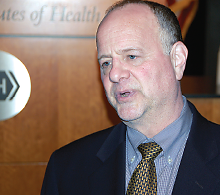Researchers Examine Cortisol’s Role Associated With Alcohol Use Disorders
Abstract
The complex interaction of stress hormones and dopamine response may affect misuse of alcohol and other drugs.
The fact that stress can precipitate heavy drinking and relapse to heavy drinking has been known anecdotally for decades. Now the biological mechanisms underlying the intersection of substance abuse and neuroendocrinology are being teased out by researchers working with both animals and humans, said endocrinologist Gary Wand, M.D. Wand presented the annual Jack Mendelson, M.D., Honorary Lecture last month at the National Institute on Alcohol Abuse and Alcoholism in Bethesda, Md.

Levels of cortisol, induced by stress, correlate with the brain’s reward response and may influence the development of alcohol use disorders, says Gary Wand, M.D.
Mendelson was among the first to identify the connection between the hypothalamic-pituitary-adrenal (HPA) axis and alcohol use disorders, noted Wand, a professor of medicine and of psychiatry and behavioral sciences at the Johns Hopkins School of Medicine.
Chronic stress raises cortisol levels with detrimental neurobiological and psychiatric consequences, said Wand, who has spent much of his career studying how stress hormones alter reward pathways in the brain and thus may lead to alcohol and other substance use disorders.
In the 1990s, Mendelson and colleagues started to recognize that people diagnosed with alcoholism had a dysregulation in cortisol dynamics, with higher cortisol levels evident during intoxication and withdrawal.
These elevated cortisol levels had a stress-dampening effect that lasted for days or weeks in early abstinence, believed to be due to alcohol toxicity after years of heavy drinking, said Wand. However, little was known about whether cortisol levels influenced the development or continuation of alcohol use disorders.
Studies have revealed that alcohol is associated with increases in adrenocorticotropic hormone and corticosterone levels in rats. However, this response was almost completely reduced if the animal was pretreated with an anti-corticotropin releasing factor (CRF) antiserum.
“That implied that CRF was the major mediator of alcohol-induced activation of the hypothalamic-pituitary-adrenal axis,” said Wand. Among social drinkers, differential activation of the HPA axis may thus be a risk factor for alcohol use disorders.
Cortisol targets that might influence drug-seeking behaviors include mesolimbic dopamine signaling, the amygdala, and the hippocampus, said Wand.
Work by Wand and others comparing glucocorticoid- and vehicle-treated mice found more than 5,000 differentially methylated regions on DNA in the hippocampus and in blood. Glucocorticoid treatment generally favored loss of methylation events: 75 percent were hypomethylated. More than 1,000 differentially methylated regions occurred in both blood and brain DNA, suggesting that blood biomarkers might someday serve as a surrogate for brain methylation changes, said Wand.
Among others, the FKBP5 gene has been closely studied in recent years. FKBP5 is associated with neuropsychiatric disorders including major depression and posttraumatic stress disorder, as well as treatment response and suicide. More than 400 individuals have been genotyped, revealing that certain highly expressed alleles regulate high cortisol production. Postmortem studies of individuals with an alcohol use disorder have also found high expression of these alleles. Severity of alcohol withdrawal also depends on expression of FKBP5 and its genetic variants.
Increased FKBP5 exposure to glucocorticoids also impairs negative feedback and produces higher serum cortisol levels, a part of allostatic maladaptation.
Thus, said Wand, “the transition to alcohol-use disorder is marked by increased cortisol, which induces increased mesolimbic phasic dopamine activity, providing robust salience and reward during early drug exposure.”
Later, in the maintenance and relapse phases, there is an allostatic shift to increased CRF and FKBP5 in the mesolimbic system. High cortisol levels cause increased expression, which can lead to negative mood states like anxiety and dysphoria that can, in turn, lead to drug-seeking behaviors.
“Blocking or reducing cortisol may normalize extra-hypothalamic stress systems and mesolimbic dopamine dynamics, and therapeutic efficacy is achieved by allowing these circuits to heal—even after years of exposure to high levels of cortisol and high levels of alcohol and other drugs,” said Wand. “In the future, I suspect we will see more human studies that manipulate the HPA axis to treat alcohol and other drug use disorders.” ■
“Stress, Alcohol, and Drug Interaction: An Update of Human Research” can be accessed here.



